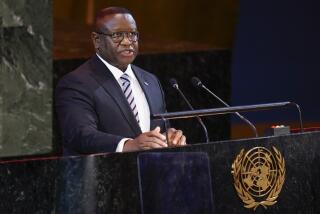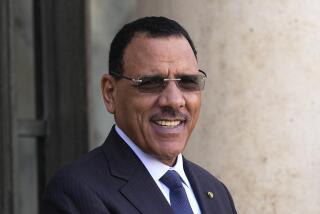Army Seizes Control of Main City in Ivory Coast
- Share via
NAIROBI, Kenya — Army troops in the West African nation of Ivory Coast seized control Friday of the principal city of Abidjan and proclaimed a military government, an uprising unprecedented in a country long considered one of Africa’s most stable.
Soldiers began seizing government installations Thursday in what they said was a mutiny over unpaid wages by an Abidjan-based unit. On Friday, former army Chief of Staff Gen. Robert Guei announced on state television that President Henri Konan Bedie was no longer in power. But Bedie claimed later in a radio interview that he retained power and was meeting with mutinous troops.
Bedie appealed for popular resistance to the coup, but occupants of Abidjan’s vast slums cheered his reported overthrow, residents said. Bedie’s Democratic Party--the only party that has ruled here in nearly 40 years of independence--has lost popular support in the past decade because of official corruption and rising demands for real democracy.
Still, as some senior military officers and foreign diplomats reportedly implored Guei to rescind the coup, independent observers found reason to hope that the crisis might be resolved peacefully. Ivory Coast has a large, educated middle class and civil society unlikely to support military rule.
Since the end of the Cold War, coups have become less frequent in Africa and have never occurred in Ivory Coast. Self-appointed rulers who once could count on the United States or the former Soviet Union to prop them up must answer to an array of Western donors. And their primary condition for foreign aid is at least the appearance of democracy.
Bedie won a disputed election and rode out protests and riots in 1995 after disqualifying his chief opponent. Soon after, he dismissed Guei as army chief and officials alleged that Guei had been plotting a coup. On Thursday, soldiers drove to the state TV station and fired into the air when some employees resisted orders to leave. Some of the employees fled to the U.S. Embassy’s cultural center nearby and told Washington Post researcher Solomon Ababio that the troops were demanding back pay for their unit’s service in a United Nations peacekeeping mission in the Central African Republic.
In parts of the wealthy downtown suburbs of Abidjan--the country’s business capital--soldiers looted shops. No deaths were reported.
From a hiding place in the city’s diplomatic neighborhood, Bedie responded in an interview on Radio France Internationale. He called on Ivorians to “resist and oppose this grotesque and retrograde military coup by all means possible” and vowed to remain at his post. He pledged to resolve the pay demands of the soldiers.
Like virtually all black African states that became European-ruled colonies, Ivory Coast is an artificial mix of ethnic groups. While the country’s founder, Felix Houphouet-Boigny, ran an authoritarian regime, he assiduously dampened ethnic tensions, partly by distributing wealth from the cocoa farms that are the pillar of the economy.
But cocoa prices have fallen, and the economy has struggled to keep up with a flood of immigration from Burkina Faso, Mali, Liberia, Ghana and other neighbors. In 1995, Bedie--an ethnic Baoule from the country’s center--alienated many Muslim northerners by disqualifying northerner Alassane Ouattara from the presidential race, and tensions concerning that issue have resurfaced as Bedie faces reelection next fall.
More to Read
Sign up for Essential California
The most important California stories and recommendations in your inbox every morning.
You may occasionally receive promotional content from the Los Angeles Times.










